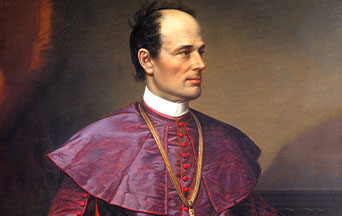
On March 14, 1870, the schema De Doctrina Catholica, which had caused the first clash between the majority and the minority at the First Vatican Council, returned to the floor. Given the previous debates on the issue, the Council created a commission tasked with reworking the schema. The commission presented a new schema titled De Fide Catholica. The presence of Archbishop Victor Deschamps of Mechelen, Bishop Louis-Édouard Pie of Poitiers, and Bishop Konrad Martinof Paderborn, seemed sufficient to guarantee that the second discussion would not provoke a new clash between the two currents for and against papal infallibility.
As it turned out, the whole project went on serenely despite continuing unrest outside the Council. However, as the examination of De Fide Catholica’s introduction began, Bishop Josip Strossmayer of Đakovo returned to the rostrum. As we have seen, he had provoked an earlier incident by protesting against the words “Pius, Episcopus, servus servorum Dei, sacro approbante Concilio,” with which the original schema had begun.
Eternal and Natural Law: The Foundation of Morals and Law
The new text retained these initial words. Therefore, the Bishop of Đakovo’s reappearance to discuss them created a lively interest among the Council Fathers.
Those Fathers were amazed when Bishop Strossmayer began his speech by defending Protestants, whom the schema severely condemned. Among other things, he stated that he knew a multitude of heretics who truly loved Jesus Christ. He further recommended that all Catholics should read the Protestant François Guizot’s refutation of Earnest Renan’s heretical Life of Jesus.1
From the beginning, the Slavic prelate’s words met with displeasure. The number of side comments from other Council fathers multiplied. Soon, a veritable storm of protests forced the presiding officer, Annibale Cardinal Capalti, to intervene. He asked Bishop Strossmeyer to end his speech.
The stenographic report documents this incident as severest unrest of the entire Council. Years later, Fernand Mourret reproduced it in his history of the Vatican Council.
Bishop Strossmayer: ‘I conclude but still have a word to say. I attribute everything that is happening to the sad circumstances of this Council.’ (At these words, a loud noise covered the speaker’s voice for a moment).
Cardinal Capalti: What you have just said is off topic. (At this point, the uproar seems to peak. Several Council members ask the speaker to come down from the rostrum).
Bishop Strossmayer: I respect the rights of presidents…(His voice is again muffled by the tumult of indignation exploding among members of the majority). I protest against every interruption. I… (the Fathers stand up, shouting: We protest against you! The president rings the bell several times).
[Council] Fathers: Come down!
Bishop Strossmayer: I protest.
“(The speaker leaves the rostrum as indignant Fathers leave their seats, exclaiming: These are the ones who don’t want infallibility. Is he infallible? Others: He is Lucifer! Anathema! Anathema! Or still: He is another Luther! Let him be expelled! And the speaker, coming down from the rostrum, repeats: I protest, I protest).”
 Learn All About the Prophecies of Our Lady of Good Success About Our Times
Learn All About the Prophecies of Our Lady of Good Success About Our Times
Fortunately, this was the only clash between the majority and the minority during the debates concerning De Fide Catholica. The other sessions went smoothly. The commission that drew up the project conducted the discussion ably. The Council carefully examined the numerous amendments presented and achieving unanimous approval of the scheme in the April 24 session.
On July 18, under the pope as presiding officer, the third public session of the Council met for the definitive ratification of the dogmatic constitution De Fide Catholica. All 667 Council Fathers present gave their consent. After sanctioning the Council’s vote, Pius IX stated:
“Having all Council Fathers without exception responded placet [it pleases] to the decrees and canons just read, We define in the same sense the truths contained in these decrees and canons, which We confirm with Our apostolic authority.
“Strive, dearest brothers, to walk accordingly and in peace in the House of the Lord. Keep constantly on this path. And since on this day Our Lord Jesus Christ gives peace to His Apostles, I, His unworthy Vicar, give you peace in His Name.
“As you know, this peace casts out fear and makes you close your ears to outside speeches. May this peace accompany you all the days of your life! May it be your consolation! May it be your strength in the hour of death! May it be your eternal joy in Heaven!”
“All Council Fathers responded, ‘Amen!’”
Thus, the Council’s first phase ended. Although these incidents caused momentary agitation, the dogmatic constitution De Fide Catholica was approved in a calm atmosphere, which justified the hopes that Pope Pius expressed.

